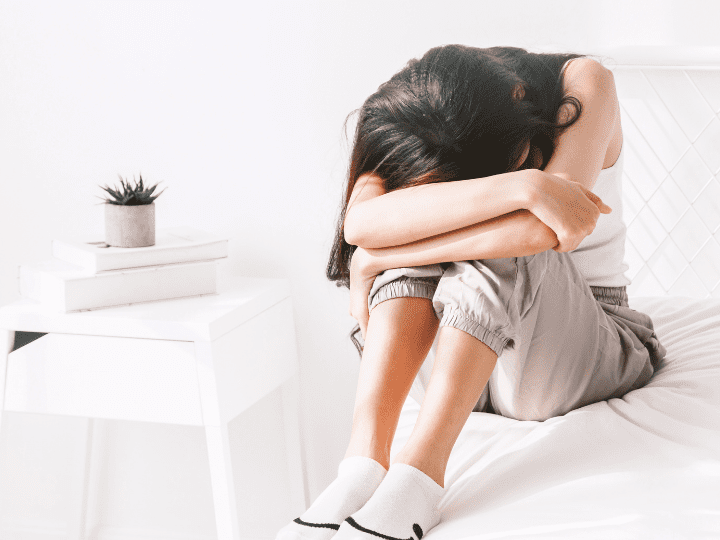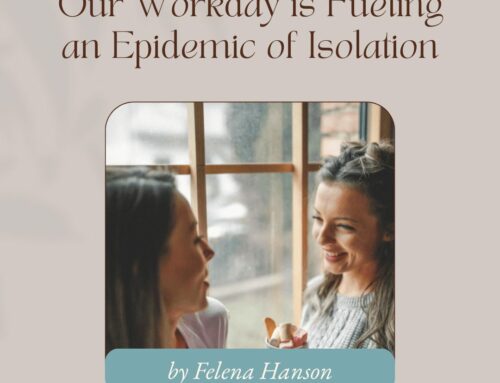This is an opinion piece written by Hera Hub’s Founder, Felena Hanson.
The topic of anxiety has been more present in my life. More than ever, I hear friends and colleagues expressing that they feel anxious on a regular basis. Obviously the pandemic has had something to do with this. Uncertainty about the future can indeed be anxiety inducing.
Anxiety disorders are the most common mental illness in the U.S., affecting 40 million adults – 18.1% of the population every year. (ADAA, 2020) “Anxiety affects people in a range of ways, often depending on the nature of the anxiety,” says Jill Stoddard, Ph.D, a psychologist based here in San Diego. “Avoidance of the triggers of anxiety is common ground for all anxiety disorders. The fight-or-flight center in these individuals’ brains becomes activated, even when no real threat exists.”
I recently discussed this topic with one of my team members at Hera Hub, Melissa Lee.
The Next Generation
Rates of childhood mental health concerns were already steadily rising over the past decade. But the coronavirus pandemic, as well as the issue of racial inequality, has exacerbated the challenges.
The American Academy of Pediatrics, the Children’s Hospital Association, and the American Academy of Child and Adolescent Psychiatry joined together to study the issue. “This worsening crisis in child and adolescent mental health is inextricably tied to the stress brought on by COVID-19 and the ongoing struggle for racial justice and represents an acceleration of trends observed prior to 2020.”
Overall, the data shows that in 2020, the percentage of emergency department visits for mental health emergencies rose by 24% for children between the ages of 5 and 11 and 31% for those 12 to 17, compared with 2019.
Teens, more than ever, feel pressure to succeed. Surveys of eighth graders revealed that they believe they need to pick a career as soon as possible, and that they are constantly comparing themselves to others in their class. I was surprised to hear a friend of mine tell me that it’s almost a part time job getting her daughter into a good high school. She is helping her eight grader build a LinkedIn profile so she has a way to share all her daughter’s extracurricular activities and accomplishments. The online applications for these schools apparently don’t give her a way to upload any additional documents. Apparently it’s not enough to just have a 4.0 anymore.
 Today’s high school students experience overwhelming levels of pressure regarding academic aptitude, athletic ability, and extracurricular engagement, based on the increased requirements for college acceptance and career advancement. Teens face intense competition regarding standardized testing, college admissions, and career planning.
Today’s high school students experience overwhelming levels of pressure regarding academic aptitude, athletic ability, and extracurricular engagement, based on the increased requirements for college acceptance and career advancement. Teens face intense competition regarding standardized testing, college admissions, and career planning.
Forty-six percent of parents say their teen has shown signs of a new or worsening mental health condition since the start of the pandemic, according to the C.S. Mott Children’s Hospital National Poll on Children’s Health at Michigan Medicine. One in three teen girls and one in five teen boys have experienced new or worsening anxiety, the poll suggests.
A survey done every year by Higher Education Research asks incoming college freshmen if they feel overwhelmed by all they have to do. In 2016, 41% of students said “yes” compared with 28% in 2000 and 18% in 1985. Teenage girls have emerged particularly at risk. From February to March of this year, emergency department visits for suspected suicide attempts were up 51% for girls ages 12 to 17, compared with the same period in 2019, according to data from the Centers for Disease Control and Prevention.
These stats combined with the rate of hospital admissions for suicidal teenagers also doubling over the past decade leaves us with many concerning questions.
Between standardized testing and a culture of achievement, today’s youth can feel pressure to succeed in ways my generation (Gen X) did not. My parents were fine with me getting Bs and barely pushed me to do any extracurricular activities.
My Experience
Over the last five years I have been a mentor for several teen organizations, such as Girls Rising, and the word “anxiety” is tossed around like confetti. They talk a lot about feeling anxious. I hear… “I’m anxious about my test”, “I’m anxious about going to school today”, “I’m anxious about what that girl thinks of me”. It saddens me to hear these phrases. This is the age that young women should be having fun, exploring their interests, making friends… not worrying about… everything.
Again, many of my close friends say they experience anxiety, and several have described it to be, at times, debilitating anxiety – to the point where they must be on the right cocktail of pharmaceuticals to function.
It makes me wonder… Why don’t I experience what many others do? Did I just get lucky? Is it thanks to my genetics, brain chemistry, personality, or life events? I would say that I probably take on more risk than the average person and have a fair bit of responsibility – running a business, being an employer, leading a community.
In my conversations with friends I began to notice that we often have similar experiences but that I typically use different words to describe the feelings around those experiences. For example, I receive the news that I have to relocate my business – I could be anxious about this or excited about new adventures. Because I know I’m in control of how I respond to these changes, I get to decide how I respond.
While I don’t feel I’m equipped to identify the causes of anxiety, I am on a mission to help the people in my life better cope with anxiety. In light of this goal, I’ve been giving a lot of thought to possible solutions.
Below are the ways I believe we can reduce anxiety. I came up with an acronym – COPE.
CONTROL – Focus on what you CAN control.
Stoic philosophy (of which I’m a big fan) teaches us this lesson. The dichotomy of control is a Stoic practice that basically states some things are within our control and others are not. It provides us a framework to be effective at solving problems by dividing them into segments. Things we can control, and things we can’t. I can’t control the landlord selling my building and tearing it down, but I can control the path to finding a new space!
OTHERS – Don’t worry about what other people think.
Again, we can only (obviously) control our own thoughts and not the thoughts of others, so why would we worry about what other people are thinking… specifically what they’re thinking of us. People are too damn busy with their own thoughts and concerns to be thinking about you. Isn’t this a bit narcissistic to think that others are thinking about us?
PRESENT – Be in the moment.
When you catch yourself replaying a conversation or worrying about that interview or conversation you have to give at school or work, find a mindfulness practice to bring yourself back to the present moment. I recommend buying yourself a beautiful piece of jewelry you love (or a family heirloom) and use that as a physical way to recenter. For others it might be breath work or a prayer/mantra you recite.
EXTERNAL – Mitigate negative external influence.
Having constant access to news and information can create heightened levels of anxiety. It can be hard to feel safe when we are constantly faced with media focusing on negative news. People often say they need to be “informed”, but do they really? The news is basically the same every day, it’s just happening to different people. This barrage of negativity could make even the most present person anxious. Social Media: A large body of research shows that people who use social media often are more anxious and unhappy than those who don’t. Comparing themselves to others has a negative effect on well-being. Moreover, spending time online keeps us from doing healthier activities, such as exercising or interacting with friends and family.
Here are also some coping tips from Melissa Lee. Breath ◾️ Give it attention / name it / let it go ◾️ Physical activity ◾️Competition, winning and losing ◾️Connection to something greater ◾️Connection to others ◾️Sense of belonging ◾️Ask for help ◾️Don’t own it “my anxiety” ◾️Share – gets it out of you, and teaches others more about it so that they can be more familiar with the experience ◾️Education – know what’s happening in the body.
Final thought from Melissa – “We are supposed to have this anxiety otherwise we would not be able to escape danger.”

How to Shift from an Anxious Life to an Exciting Life! Labels matter!
We all know that our thoughts affect our emotions. But when we are in a state of fight or flight it can be difficult to float above ourselves and observe the situation from an objective perspective.
It is well recognized that it’s difficult to be sad when you put a smile on your face… this simple act changes your emotion.
I invite you to try this for one week. When you start to feel anxious, pause and choose a different word to relabel that emotion.
I like the word “excited”
But, if the word excited doesn’t fit, then pick something that works for you, like enthusiastic or eager.
Examples:
“I’m anxious about my presentation tomorrow.”
“I’m excited about my presentation tomorrow.”
“I’m anxious about the conversation with my mom.”
“I’m eager to have the conversation with my mom.”
“I’m worried about getting that new job.”
“I’m enthusiastic about the possibility of landing that new job.”
I recently learned about the word “Frisson”. It captures the combination of fear and excitement that often seems to accompany taking new steps into the unknown. As per the Oxford Dictionaries: A sudden strong feeling of excitement or fear; a thrill. Perhaps this is a fit for you?
Or from Urban Dictionary – “Nervousited”
The sensation of being nervous and excited at the same time.When you want to jump up and down and yell “YAY ME!” but you also want to curl up in a teeny tiny ball and hide at the same time.
It doesn’t matter if it’s a familiar word, a new word or a made up word. What’s important is the emotion behind it.
Final Thoughts
Of course I do experience (what many would call) anxiety now and again. For example: when I have an early morning flight I wake up several times throughout the night, concerned that I didn’t set my alarm correctly or that I will somehow sleep right through it. I have dreams that I forgot to pack and I’m scrambling at the last minute to throw everything in a bag and run out the door. I argue that this concern is normal and healthy. Furthermore, I do all I can to NOT schedule early morning flights – no reason to put myself through this. I’m in control! And I choose to relabel this “excitement” not anxiety. I’m excited to get to my destination.
While it might be impossible to abolish anxiety all together, I suggest that you can slowly rewire your brain by trying on the relabeling exercise and keeping COPE close at hand. Try it out for a week or even a day and try to notice your feelings and emotions.
Let me know how this works for you! I want to hear your experience!
Like this line of thinking?
Felena also wrote an article about beating anxiety with music.
Read/watch that here – http://MindMasterMusic.com.





